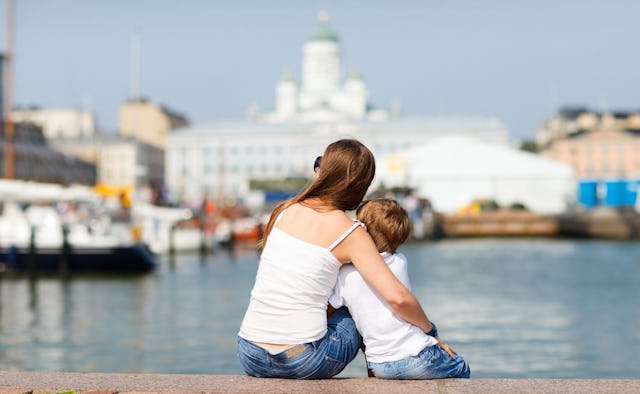The Religion I Teach My Children Begins With Kindness And Compassion

When I was a kid, I attended church every Sunday and was often dragged to Wednesday night meetings, too. My mother is a second-generation Christian Scientist who eschews all medical attention, as she did for her children. I remember praying for better vision so I wouldn’t need to wear glasses. (It didn’t work.) My siblings and I invoked the power of God while weathering measles and chicken pox because we were never vaccinated. (I finally got my shots as an adult.) And when I was thrown out of a convertible on the last day of ninth grade while getting a ride to a fun school picnic, I awoke the next morning, seriously injured and fully immobile, alone in an ICU ward with the following, blessed realization: Thank God my mother is out of town at a church convention! Or else I might not be here. (Harsh, but true.)
My husband, in turn, went to Bible camp in the South, where kids as young as 9 were asked things like, “If you were lined up opposite a firing squad and asked to denounce Jesus, would you? Or would you refuse to forsake your Lord—and take the bullets?”
Needless to say, neither of our two kids has ever gone to church. We don’t take them. They don’t miss it. But that doesn’t mean they don’t have faith. It doesn’t mean they don’t believe in the power of God, or doing right, or being good. They just believe under different terms. There is zero hellfire and brimstone in our house.
Our religion is something else. It’s organized, too, just not in the way you might think. We teach them kindness—it’s the most important thing. And compassion for those less fortunate. They’ve learned to respect their elders, to always remember their manners, especially with adults. We instill in them our values: Work hard and always tell the truth. There’s no room for cheating or lying; these character flaws inevitably fell the most towering of achievements. They take responsibility and are held accountable. They are not allowed to speak to their sibling in a snide tone. They know how to apologize with sincerity. They treat others as they wish to be treated. Our kids are reminded daily of how lucky they are, and why: The world can be a dangerous and unfair place, especially for girls, and they understand how they enjoy a first-class education, a solid roof over their heads, and abundance on their dinner table each night. We teach them to be grateful, to see the world beyond their own limited periphery.
When our kids ask us who we think God is, we say, “He’s Love, with a capital ‘L.'” A force of love that connects us all. When they say, “But what does God look like? We can’t see Him,” we respond, “What does our love look like for you? Can you see it? Or do you just feel it here“—we point to their hearts—”and know it’s there? And know it’s true? And real?”
We encourage them to meditate quietly and seek God out when they need solace. To think of Him as an eternal friend who longs to listen. To ask Him for guidance if they need it. To listen for, and expect, the answers. And to believe in a greater force of good, of which they are a part. Of which their good contributions are so desperately needed in this world.
Beyond that, we try to model love in our home. We are affectionate and tight-knit. We are there for one another, always.
Like us, many parents are turning away from traditional—or, as in my childhood situation, untraditional—religion for their kids. Maybe it’s because they have close gay friends who were condemned in the church as sinners, and they can’t reconcile this discrimination. (Our kids have three dear “f’uncles,” or “fun, fake uncles,” who fall into this category.) Maybe it’s because they find too many inconsistencies in religious texts that defy logic. Maybe it’s because they never really found God inside the four walls of an institution. Perhaps they find God elsewhere, and define Him—or Her—differently.
As I grew up, I decided I didn’t have to accept an all-or-nothing affair: Believe this rigid dogma, or find the flames. Some of us look beyond and above limited human musings—as we read them to be, anyway—and glean our own sense of spirituality in quieter places. Our kids aren’t confused, nor will they grapple with what some of us consider to be overt hypocrisies when they reach the age of reason.
They are certain to have questions as they get older. But I don’t think I’ll struggle much to answer their queries. I don’t tell them things I don’t fully believe, or understand. And when something is beyond my comprehension—like why we’re here, for starters—I say so. Plain and simple. I’m OK with not having a text to tell me why everything is, or isn’t. I’m OK with the not knowing. I expect their internal compasses will steer them right, because we’ve helped set their gears. I believe our kids are OK. And I believe God is good with them, too.
This article was originally published on